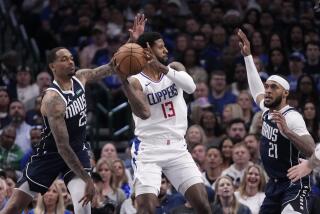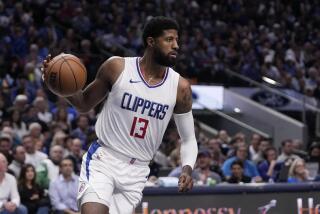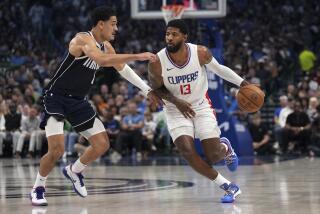George Can’t Afford to Hide
- Share via
Obscurity and low expectations always served Devean George well.
He flourished at Augsburg College, an NCAA Division III school in Minneapolis and did well enough to become the Lakers’ first-round draft choice in 1999.
He had his best playoff game when he wasn’t even supposed to be on the court, four days after he’d severely sprained his left ankle during the San Antonio series last spring.
So the first reaction to the Lakers’ blockbuster acquisitions of Gary Payton and Karl Malone was that George would be left in the shadows, where he’s most comfortable. When George’s name is announced in the starting lineups, the only sound you’ll hear will be the camera flashes recharging between intros of the Hall of Famers.
“A lot of people kind of say that the All-Stars are coming, you’re going to get buried in the mix,” George said. “I look at it in a different way. I looked at it as, ‘That’s less focus that they’re going to pay attention to me.’ So I did a lot of work, spot-up shooting ... so if they’re going to leave me open, I can make them pay.”
The great irony in this is that the addition of Payton and Malone to a lineup with Shaquille O’Neal and Kobe Bryant, combined with Rick Fox’s ongoing rehabilitation for a foot injury suffered in the playoffs, makes George’s role in the starting lineup more important than ever.
Whom are you going to leave to send a double-team? O’Neal, the game’s dominant big man? Malone, who has scored more points than all but one player in NBA history? Bryant, the guy who went for 40-plus in nine consecutive games last year? Payton, an All-Star the last nine seasons?
Or George -- whose scoring average is 5.4 points?
George should get more open shots than a gunner at the target range. If he can’t knock them down, defenses will pack even tighter around O’Neal, choking off the heart of the Laker attack.
George is fully aware of this. He understands this is how the game is played. If you bat behind Barry Bonds, he’ll be intentionally walked to get to you, no matter how well you’re swinging the bat.
“Most of the double-teams are probably going to come off of me,” George said. “There’s not as much attention paid to me.
“I guess it’s just a numbers game. They’ve proven more than me, they’re All-Star players so they deserve more attention than me. I don’t take it as a slap in the face.”
The problem is, George doesn’t always respond when he’s in the spotlight. After an effective season as a reserve in 2001-02, when he averaged 7.1 points and gave the Lakers another athletic player besides Bryant, he couldn’t sustain it during the playoffs. His scoring average dipped to five points and his shooting fell from a career-high 41.1% in the regular season to 36.5%. His teammates, who had joked that he would be driving a Ferrari after his new contract, now said he was going to be driving a Trans Am.
Since there weren’t any future Hall of Famers willing to join the Lakers for the mid-level exception in the summer of 2002, the Lakers used the money on George, signing him to a contract worth up to $18.64 million over four years.
Last season, George regressed slightly, his averaging dipping just below seven points and his shooting percentage dropping a tick below 40%. Tendinitis in his right ankle caused him to sit out 10 games, five while on the injured list, but teammates -- most notably Bryant -- questioned his toughness.
George insists that he’s better for having gone through it all, that he understands how to use scouting and preparation and the understanding of his teammates’ roles to get through nights when he isn’t feeling 100%. And he showed up at training camp physically stronger. Not only did he work out at Healthsouth during the summer mornings, he came back at night and shot jumpers in the empty gym.
But the first two shots reporters saw him shoot during a scrimmage in Hawaii missed badly. He did make seven of the 13 shots he took during the two exhibition games against the Golden State Warriors. But he had three turnovers the first night and only three rebounds in 22 minutes the second night. There’s still concern among the coaching staff whether George will be aggressive enough in the offense, whether he’ll be able to attack and relieve pressure from O’Neal.
Saturday, Coach Phil Jackson said George to that point had been a “disappointment.”
George’s reaction?
“No reaction to it, really,” George said. “I’ve been here. I understand what’s going on. No reaction to it. It didn’t bother me at all. I just continue to do what I’m doing.”
Just Phil being Phil. But it had the intended effect.
“He came back and played,” Jackson said. “That was the response I wanted. I just wanted him to be consistent and work real hard every day.
“I think he’s going to have to be a key rebounder for us. We have two guys in Karl and Shaq who aren’t reacting well to the basketball for rebounds. He’s got to react to the ball for rebounds, Kobe has to react to the ball for rebounds, Gary has to get his share of rebounds.
“Those are really important things for us. And he’s taking on a big defensive load every night. His players are all going to be scorers at that position. And at the offensive end, he’s going to get open looks, because people are going to be compensating for other players.”
George insists he’s up to the task, and he’s aware of his value.
“I think we all bring something to the table,” he said. “It might not be as much as Kobe and Shaq, but we all bring something to the table that helps the team.
“It’s a puzzle. And the puzzle’s not together unless the small piece in the corner is filled. Sometimes I’m the small piece in the corner, but it still needs to be filled for the puzzle to be complete.”
Far from the headlines, an important component in the Laker season will be played out. Will George be the right piece ... or will he be puzzling?
J.A. Adande can be reached at j.a.adande@latimes.com.
More to Read
All things Lakers, all the time.
Get all the Lakers news you need in Dan Woike's weekly newsletter.
You may occasionally receive promotional content from the Los Angeles Times.







